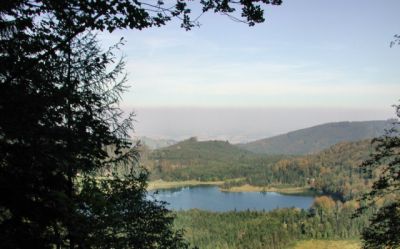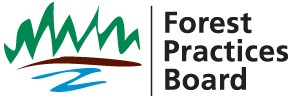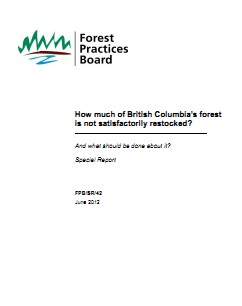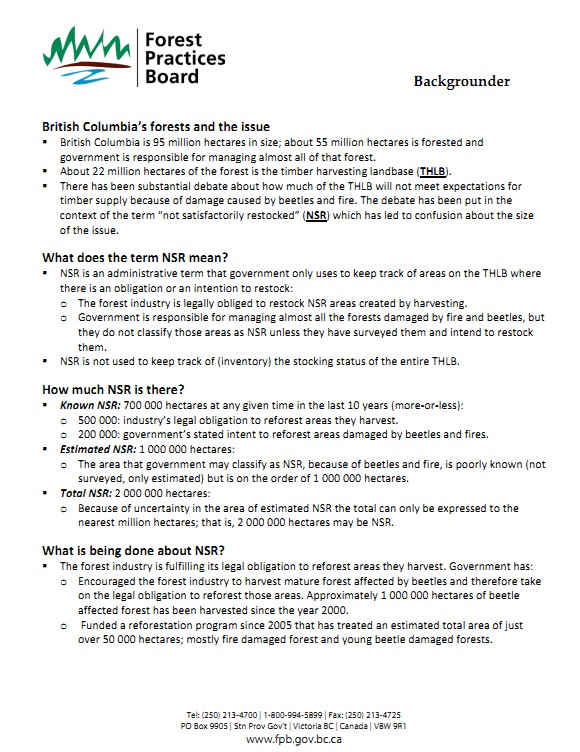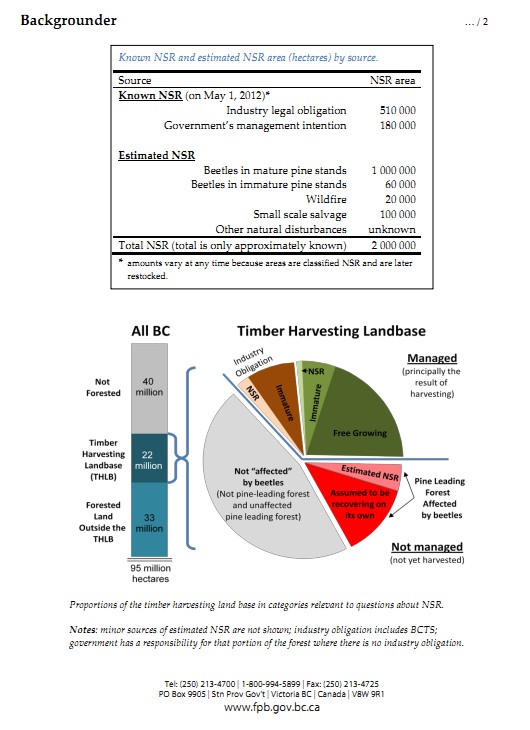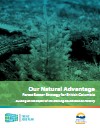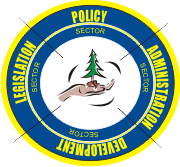In response to concerns expressed by local communities, Ministry of Forests, Lands and Natural Resource Operations staff have been analyzing potential opportunities to increase timber supply. A draft summary of detailed technical analyses for the Lakes, Prince George, Quesnel and Williams Lake...
British Columbia's public dispute on Sustainable Forest Management
Are British Columbia's forests well managed?
by Anthony Britneff, 2011
|
|
... |
How to solve public disputes on forests? |
In British Columbia, a dispute continues over just how sustainably managed are British Columbia’s publicly owned forests covering some 55 million hectares of the province, which is 94 million hectares in size.
At the heart of this dispute is the extent of productive forestland disturbed by wildfires, wind, diseases and insects that is not stocked with trees.
Over the last decade, some 17.5 million hectares of lodgepole pine forests have been infested by the mountain pine beetle. The beetle infestation has not been confined to mature forests but has also affected immature pine forests.
Over that same decade, British Columbia has seen some of the worst years for wildfire in recorded history with over a million hectares having been denuded by wildfire.
With an inventory that is over 15 years old for much of the province, questions are being asked about the provincial extent of the not stocked area, which has implications for the rate of harvest, for carbon accounting, for sustainable forest management, and for forest certification.
With the forests ministry unable to generate a province-wide not-stocked area from its forest inventory and with wildly different estimates of the extent of the not stocked area being made by foresters in the media *, the public’s watchdog, the Forest Practices Board, has initiated a special investigation to clarify the status of British Columbia’s not stocked lands. The Board's special report is expected to be released early in 2012. The terms of reference are posted at:
|
You might be interested in reading this small booklet by Ben Parfitt as well |
|
Timely decisions about restocking BC forests for future timber supply needed
The report indicates that almost two million hectares of Crown forested land could potentially be “not satisfactorily restocked” (NSR). Of that, nearly half a million hectares will be restocked by industry and government has current plans to restock about a quarter of a million hectares. “Decisions about whether to replant areas where mountain pine beetle and fire have killed most of the trees will have an impact on the future timber supply in the BC interior,” said Al Gorley, board chair. “At a minimum, if nature is left to take its course, the eventual crop of timber in those areas will be delayed.” Government has a reforestation program for these areas, but to date it has only directed limited effort at re-stocking mature, beetle-affected forests because those areas might still be harvested – and eventually restocked – by the forest industry. “There is a lot of debate about exactly how much forest has been damaged by fire and beetles,” said Gorley. “But the important question is, should we invest money now to ensure a healthy timber supply into the future, and, if so, how will we raise and invest it? But if action is to be taken, it must be taken quickly.” The Board has made recommendations to government that it hopes will promote a useful dialogue on the topic of restocking British Columbia’s forests. The Forest Practices Board is B.C.’s independent watchdog for sound forest and range practices, reporting its findings and recommendations directly to the public and government. The board can investigate and report on current forestry and range issues and make recommendations for improvement to practices and legislation. |
|
NEWS!!!
July 2013: Some thoughts about the current situation, by Anthony Britneff
In this year's budget debate for the Ministry of Forests, Lands and Natural Resources Operations (MFLNRO), the loyal Opposition posed some really interesting questions on topics that really matter to British Columbians; topics such as wildfire protection surrounding communities; TFL tenure; industrial water usage and fees (e.g., for fracking) and sustainability of forest management especially with respect to forests, animals and habitat.
As a registered professional forester (retired), I find many of the Minister's answers to questions from the loyal Opposition to be weak failing to inspire confidence in how the government is managing our publicly owned natural resources. In particular, it appears that the government is failing to charge enough money in fees and rents for natural resources, which means it is not asserting the financial interests of the public because it is essentially giving away the natural resources.
Without sufficient revenue, the government is failing to invest in the land and chooses to see stewardship activities like tree planting and inventory as expenses that can be cut instead of as necessary investments that must be maintained in order to generate future revenues to fund education, health and other social programs. This year the government cut the MFLNRO budget by $40 million targeting forest stewardship with $35 million or 88 per cent of the cut.
For example, before 2000 the forests ministry spent more on tree planting alone than it does today on all these stewardship activities combined: tree planting; inventory; silviculture; research; tree improvement and genetics; monitoring and treatment of insects and disease; fresh water management; timber supply analysis and AAC determination; watershed restoration; fish, wildlife and habitat management; land-use planning; visual quality management; and climate change.
This fact alone should be enough to outrage every British Columbian concerned about the economy, job security and a secure future for our children. Given the global pressures of an unstable financial system and climate change, British Columbia's long-term economic security will depend on how well it cares for its renewable natural resources today because they, not the non-renewable resources, have the potential to provide for economic resiliency in an unstable global economy.
For your information, I am attaching web links to the complete Estimates Debate for the forest ministry and I strongly recommend you peruse the questions and answers:
DAY 1
Monday afternoon starting 1440 at:
http://www.leg.bc.ca/hansard/40th1st/20130708pm-House-Blues.htm
DAY 2
Tuesday morning starting 1005 at:
http://www.leg.bc.ca/hansard/40th1st/20130709am-House-Blues.htm
Tuesday afternoon starting 1425 at:
http://www.leg.bc.ca/hansard/40th1st/20130709pm-House-Blues.htm
Anthony Britneff, retired after 39 years of public service with the B.C. Forest Service is still worrying about British Columbia’s forests and is therefore a valiant champion of the sustainable management of forests of his homeland.
British Columbia Auditor General John Doyle has released his latest report, An Audit of the Ministry of Forests, Lands and Natural Resource Operations’ Management of Timber.
Nearly two-thirds of British Columbia’s 95 million hectares is forested. These forests contribute to employment, tourism and recreational opportunities, as well as generate significant revenue for government to finance public services. However, trends indicate that the future availability of timber will be smaller and less diverse, putting future revenue opportunities at risk. Stewardship responsibility for these forest resources lies with the Ministry of Forests, Lands and Natural Resource Operations.
Confidential report warns pine beetle set to destroy B.C. forestry jobsThe full, devastating impact of the pine-beetle epidemic that has swept across British Columbia will be felt in the next few years when up to half the forest-industry jobs in the province’s interior will vanish, according to a government report meant to be confidential. You can download the report here (other sources of the report: The Globe and Mail, internal) The document, a briefing report for the provincial Forests minister, was inadvertently posted on the internet. It gives details on the unfolding timber supply crisis that threatens “the short and medium-term sustainability” of communities that have depended on logging for generations.
The Government of British Columbia: Mid-Term Timber Supply ProjectAugust 15, 2012: October 2012:Letter from Steve Thomson, BC’s Minister of Forests, Lands and Natural Resource Operations regarding timber supply action planTwo answer letters: One from Dr. Fred Bunnell, a world renowned conservation biologist: http://www.vancouversun.com/news/Provincial+timber+policy+lacks+relevant+data/7386407/story.html
And this one from Ed Mankelow: http://www.timescolonist.com/Logging+growth+step+backward/7386190/story.html Ed Mankelow has been involved in B.C. parks protection and establishment since 1961. He was the chair for many years of the B.C. Wildlife Federation’s parks committee and past chair of the Canadian Wildlife Federation’s parks committee. His role has always been to protect the parks and wilderness. Both writers are responding to the government's response to the report of the Special Committee on Timber Supply -- here is the link: www.gov.bc.ca/pinebeetle
Anthony Britneff gave an interview to discuss overcutting issues in BC: The BC government says it is opening the door to the idea of logging old-growth forests to help boost timber supply. Forests Minister Steve Thomson insists any decision to cut would be based on science and would only be done if consensus was reached from all members of the community. As many as eight sawmills face closure as the timber supply grows thin. Examining the old-growth potential in central BC is just one of several actions the province plans to take.
January/February 2013:Ben Parfitt: Sneaky Liberals are planning a B.C. forest giveaway Given the short duration of the upcoming legislative session and the provincial election to follow, a government plan to introduce a scant two-paragraph bill granting it powers to fundamentally alter the course of forestry in B.C. is disturbing, to say the least. According to several sources who have been briefed on the legislation, the bill would give the provincial cabinet powers to grant forest companies de facto private control over public forestlands without first having to notify or consult with the public. Instead of companies enjoying rights to log set volumes of trees on public forestlands, companies would gain dramatically expanded powers to log trees on defined areas that in effect become their own semi-private fiefdoms. The bill follows a year in which the government has faced mounting criticism over a forest-health crisis due to decades of over-cutting and an unprecedented mountain pine beetle attack. Numerous sawmills now face closure, with all the hardships that portends for many rural communities. It also follows the losses of sawmills in Burns Lake and Prince George due to explosions and ensuing fires. In the wake of those events, various government documents were leaked indicating that the provincial government was revisiting a controversial “rollover” idea first pursued 25 years ago. At that time it met with such a groundswell of political and public opposition that the initiative was scuttled. Then-provincial forest critic and MLA for Prince Rupert, Dan Miller, called it “privatization on a massive scale” and warned: “Never before in the history of the province has this kind of giveaway been contemplated.” --------------------- MInister Steve Thomson: Nothing sneaky here I'm writing in response to Ben Parfitt's speculative and misleading Jan. 27 op-ed about upcoming proposed forestry legislation. Here are the facts: On Aug. 15, the bipartisan committee on timber supply released its unanimous report after visiting 15 communities and reviewing over 650 submissions. One of its recommendations was to enable the conversion of volume-based forest licences to area-based forest licences. On Oct. 9, I released Beyond the Beetle: A Mid-Term Timber Supply Action Plan - the government's response to the report, which contains the commitment to introduce legislation and states, "one requirement for any proposed conversion will be ensuring that the public interest is addressed, through the support of the local community, First Nations, stakeholders and the public." To reiterate: a public commitment in response to a public report, with public consultation needed before implementation - certainly not sneaky in my books. Steve Thomson, minister of Forests, Lands and Natural Resources -------------------- In response to Ben Parfitt’s op-ed about the B.C. Liberals’ intention to introduce legislation to rollover replaceable volume-based timber licenses to area-based tenures, the forests minister claims as a “fact” that the legislation stems from a recommendation from the special committee on timber supply that toured B.C. last summer. That is pure fiction. According to a leaked cabinet document, the “rollover” of volume-based licenses to area-based tenures was recommended to cabinet in April as an option to enable the rebuilding of the Burns Lake sawmill — a month before the committee was formed and five months before it made its recommendations public. The committee did not “in fact” recommend the conversion of volume-based licenses to area-based tenures. Rather, it gave significant and thoughtful cautionary recommendations “if conversion to more area-based tenures is desirable.” The committee found there is still no consensus on the relative merits of area-based tenures and significant concern about the potential privatization of our largest public asset. The minister also gave Hampton Affiliates a “letter of intent” in September committing to the conversion of this U.S. company’s volume licenses to area-based tenures — a full month before he publicly released a response to the committee’s recommendations. The fact is: the Liberals were on the rollover path long before any public process. Enabling legislation will not guarantee in law any defined public process in the rollover decisions. It is used to give politicians “flexibility” to take actions without the constraints of law or guiding regulations. Used inappropriately, it can be a very “sneaky” instrument indeed. We must oppose giving politicians the unfettered right to radically alter forest tenures or to privatize our public forests. I certainly intend to do that in this upcoming session. It would be nice to know if the NDP will join me in this fight. Bob Simpson, MLA, Cariboo North -------- Prove me wrong Forests Minister Steve Thomson takes issue with the “highly speculative” nature of my recent op-ed in which I suggest that the provincial government intends to grant cabinet open-ended powers to give forest companies de facto control of public forestlands. He does not quibble with the fact that legislation is, in fact, coming, but says that government will be open and accountable by “ensuring” that the public is consulted. But will public consultation be enshrined in law? That’s the question. If Mr. Thomson wishes to end speculation that the interests of First Nations, communities and other stakeholders could be circumvented in the upcoming bill, he should simply publish the contemplated legislation. I would consider it a public service and a small price to pay to be proven wrong. Ben Parfitt, Canadian Centre for Policy Alternatives
|
You may draw your attention to this site as well: Healty forests and healthy communities - A conversation on BC Forests
British Columbia's dispute on Sustainable Forest Managment (SFM)
British Columbia: Mid-Term Timber Supply Project
B.C. plan would open Interior’s protected woods for logging
Old-growth forests, wildlife corridors and other long-protected timber zones in the British Columbia Interior could be opened up to logging in order to keep mills operating, according to a cabinet document detailing a proposal under consideration by the provincial government. The document, stamped...
Power Grab Eyed by Clark Gov't to Set Logging Levels
A leaked provincial cabinet document indicates that the provincial government is contemplating "suspending" the powers of one of its most powerful public servants in order to expedite a controversial logging program that has raised alarm bells in the professional forestry community.
Thousands of forestry jobs on the line in central British Columbia
A confidential report was leaked this week indicating the British Columbia government is expecting north-central B.C. to lose 32% – 67% of its timber supply due to the mountain pine beetle epidemic without a mitigation plan.
A Shocking Glimpse of BC's New Forest Plan
For more than a quarter century, logging companies at the government's blessing have been on a tear through British Columbia's expansive interior forests. In the name of "salvaging" economic value from forests attacked by mountain pine beetles, beginning with a smaller outbreak centered in the...
Opposition mounts to government talks on opening forest reserves to loggers
The B.C. government is holding talks with the forest industry over ways to supply more timber to beetle-hit Interior sawmills, including the option of opening forest reserves that have until now been out of bounds to loggers.
Confidential report warns pine beetle set to destroy B.C. forestry jobs
The full, devastating impact of the pine-beetle epidemic that has swept across British Columbia will be felt in the next few years when up to half the forest-industry jobs in the province’s interior will vanish, according to a government report meant to be confidential. The document, a briefing...
British Columbia releases new Forest Sector Strategy
British Columbia released its Forest Sector Strategy today. Titled “Our Natural Advantage, Forest Sector Strategy for British Columbia”, the strategy aims to build upon the report of the Working Roundtable on Forestry to support a more vibrant sector that supports employment in every part of the...
Logging in forest reserve areas within MPB epidemic area
Honorable Steve Thomson Minister of Forests, Lands and Natural Resource Operations PO Box 9071 Stn Prov Govt Victoria, BC, V8W 9E9 Honorable Pat Bell Minister of Jobs, Tourism and Innovation P.O. Box 9049, Stn Prov Govt Victoria, BC, V8W 9E2
Panic in the government should not descend into head-over-heels panic
Minister Bell Parliament Buildings Victoria, BC V8V 1X4 Dear Minister Bell, There are many reasons why what the Globe and Mail terms “panic in the government” should not descend into head-over-heels panic. Logging long-protected forest areas will certainly appear as panic and a government that...
A crisis of neglect in the province’s forests
In 1985, the rapidly growing amount of not-satisfactorily-restocked (NSR) land in B.C. forests became a crisis. This resulted in a joint provincial and federal $300-million funding plan, the Forest Resource Development Agreement (FRDA) that restocked many thousands of hectares.
Politics trumps reason as B.C. eyes bid to raid protected forests
The fire that destroyed the lumber mill in Burns Lake this winter was sudden and catastrophic, sending a small town into shock. Overnight, 250 jobs vanished. Imagine a blow that severe landing on a dozen different communities and you have a sense of what is coming in central and northern British...
Transforming forest management in B.C
The recent auditor-general's report on government mismanagement of our forests should serve as a wake-up call to the people of British Columbia to demand transformation of forest governance and management. Healthy forests provide us with clean water and clean air. They store three-quarters of the...
Timber inventory a guessing game, critics charge
The B.C. government is not adequately keeping track of its inventory of timber lands, according to NDP Leader Adrian Dix. And that means the province is putting off some tough decisions, he says, on managing what’s left of pine-beetle-ravaged forests. While the mountain pine beetle has been...
B.C. risks becoming a silvicultural slum
Re: B.C.'s resources need support, Column, Feb. 17, Province fails to protect, restore beetle-ravaged area: report, Feb. 17 Both Stephen Hume and Auditor-General John Doyle have pointed out in spades the neglected state of B.C.'s forests. Without corrective action - and yes, that means money and...
Foresters join warning cry over risk to forest sustainability
B.C. forest inventories are so far out of date that the foresters' professional association is questioning whether provincial forestlands can still be managed sustainably. A report by the Association of B.C. Forest Professionals released Monday says that at a time when wildfire and insect pests...
Auditor General report on forestry - A trust betrayed
The Auditor General of British Columbia has released a report that is sharply critical of the BC Government and Ministry of Forests’ management of BC forests. Indeed, it would be hard to find a government report that is more withering in its criticism.
B.C.'s efforts not enough to halt forestry declines
B.C. auditor general John Doyle said in a report released Thursday that the province is ill-prepared to manage the province's beetle-ravaged forests, which are heading toward a long-term decline in both value and diversity. "We are already facing the fact that the value of the forest is going to be...
BC Government Killing Forest Industry: Auditor General
Worse, the government lacks reliable information on the state of the forest and has no plan for what to do about it, he said. Various observers said Doyle's report confirmed what critics have said for years, but the minister responsible insisted the province has a plan and is doing the necessary...
Aging Forests Ministry in poor health
The ravages of age usually affect people more than institutions. But successive reports on two of the oldest government functions in B.C. have found they are in failing health. A searching look last week at the justice system - a ministry since 1871 - portrayed it as floundering badly. And this...

